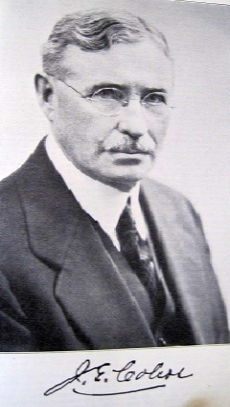JOHN EDWARD COHOE
 Soldier, barrister and official of various courts, the name of Colonel Cohoe stands out as one who has a record, not only in the World War service, but in civilian life as well; and is a man who holds the confidence of the public, and is regarded as a man of sterling worth and fixed integrity.
Soldier, barrister and official of various courts, the name of Colonel Cohoe stands out as one who has a record, not only in the World War service, but in civilian life as well; and is a man who holds the confidence of the public, and is regarded as a man of sterling worth and fixed integrity.
Mr. Cohoe was born on March 18th, 1871, at Fonthill, Welland county, Ont., and is the son of John Edward Cohoe, a farmer, also born in Fonthill. His great, great-grandfather, Ambrose Cohoe, settled in Fonthill in 1787, and died there in 1789, he was a U.E. Loyalist, and his children were given some of his land presented to him by the Crown. Mr. Cohoe, the subject of this review, has one brother and one sister, and when he was four years old moved to Wainfleet, and first attended school there, and then graduated from the Welland High school. In 1887, at the age of sixteen, he enlisted in the army as a private in the old 8th Company at Wellandport. In 1888 and 1889 he went to military school at Toronto and became a lieutenant; was given a certificate, second class, and then first class. Became a captain, then a major and became commander of the 44th battalion about 1902, and continued as such until 1908. In 1894 he graduated from Osgoode Hall, a law school at Toronto, and practiced law in Welland under the firm name of Raymond & Cohoe for about ten years. In January, 1905, he was appointed Local Register of the Supreme Court, Clerk of County Court, and Register of Surrogate Court. He was Liberal organizer for a number of years, about ten years prior to 1904.
From 1908 to 1911 was Brigade Major of the 5th Infantry Brigade, and in 1911 to 1914, was in command of the 5th Brigade. When the World War broke out he took charge of the frontier force of canal, then went overseas. Went to England in command of the 4th Infantry Brigade of the first contingent, and was first stationed in England at Salisbury Plains. He was then commander of the infantry at Pond Farm Camp, and afterwards Sling Plantation Camp in England. At Pond Farm Camp he had the Newfoundland troops under his command. At Sling Plantation Camp he had New Zealand troops under his command. When the Frist Division went to France Colonel Cohoe was returned to Canada; he did not go to France nor did he see any active service. On his return to Canada he was given charge of training the infantry at London, Ont. He was in England about five months; volunteered to go to Siberia in 1917, but was not accepted; is now a full colonel and on the reserve list of officers. In 1912-1913 he took the militia staff course, and in May, 1914, passed the examinations for tactical fitness for command. The colonel was married in Welland in 1894 to Miss Clara Jane Holcomb, daughter of C.V. Holcomb, a farmer of that place; they have three children: Dorothy Ellen, the eldest, married to Major Hugh W. Murray of Toronto, and they have two children; Donald A. Grant and Dorothy Jane. John Edward Cohoe, age thirty-one, is fourth in the family with the same name; is single. He went overseas with the Artillery, 17th Battery, and was in the final drive at Amiens, and went to the Rhine after the Armistice with the army of occupation, and was quartered at “Bonn” with a professor of that German university.
When the son came home he went to the School of Science at Toronto University, and graduated from there in 1923, and since that time has been with the International Nickel Company, at present working in Port Colborne as superintendent of the refinery. Ruth Buchanan died at the age of five, 1903 of heart failure. *She is buried in Smith Cemetery, Welland. Colonel Cohoe in his social contacts is a member of the Welland Club, and the Lookout Point Golf and Country Club-golf being his hobby. He is a Mason; is a past deputy grand master of this district, member of Merritt Lodge, past grand superintendent of Niagara District , Royal Arch Masons, past first principal of Willson Chapter, and an ex-warden of the Church of England. In his younger days he took a great interest in athletics, played football at Osgoode Hall, and on the Welland cricket, baseball and football teams.
A.E. Coombs
History of The Niagara Peninsula and the New Welland Canal
1930
 Subscribe..
Subscribe..
Add A Comment
You must be logged in to post a comment.